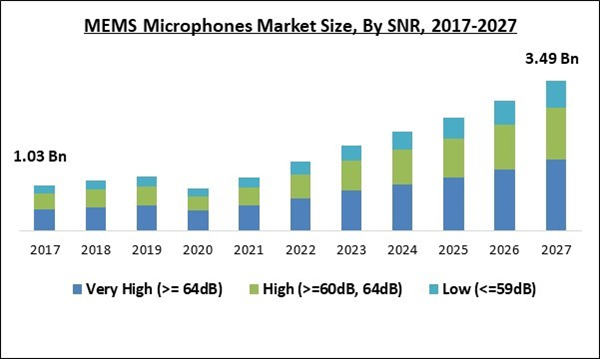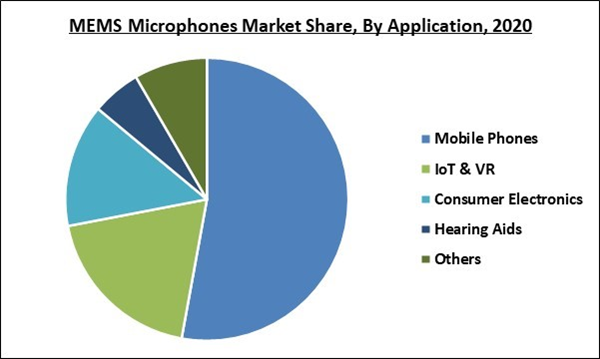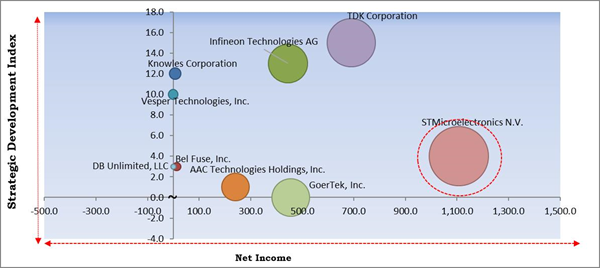The Global MEMS Microphones Market size is expected to reach $3,497.90 million by 2027, rising at a market growth of 19.04% CAGR during the forecast period.
MEMS (microelectromechanical systems) microphones refer to miniature devices that offer high fidelity acoustic sensing. Also, these microphones can be easily embedded in an electronic product having restricted space. These microphones are also integrated into smartphones and other consumer products like smart speakers and headsets. In the present scenario, these microphones not just record plain ambient sound, but they also assist stereo capabilities, directivity (through beamforming), active noise cancellation, voice recognition, and other capabilities.
Factors such as the rise in demand for smartphones, IoT-based devices, hearing aids, virtual reality (VR) headsets, and other consumer electronics are anticipated to create lucrative growth opportunities for the MEMS microphones market.
COVID-19 Impact Analysis
Since the onset of the COVID-19 pandemic from China, many industries faced a drastic downfall due to the lockdown of stringent measures. Among these industries, the semiconductor market was the most impacted as the majority of manufacturing facilities based in China were compelled to close down their operations, thus drastically hampering the supply chain operations.
On the flip side, the demand for microphones in home automation devices, retail stores, healthcare, and grocery boosted the growth of the MEMS microphone market during the pandemic period. In addition, with the relaxations in the lockdown conditions, the rise in demand for voice interface technology is expected to increase, which is expected to make recovery in the MEMS Microphones market during the forecasting period.
Market Growth Factors:
The growing popularity of advanced consumer electronics
The majority of consumer devices like tablets, smartphones, and smartwatches have integrated microphones in them. The demand for microphones is further fuelled by the rise in demand for these devices. Devices like tablets and mobile phones require compact, thin, and low-power consuming components. As the number of audio applications and features increases, microphone technology becomes more crucial. Moreover, the growing disposable income of the individuals is expected to also drive the demand for higher comfort and security through smart devices and appliances.
Increase use of microphone in industrial application
For a long time, microphones have been deployed across a wide range of industrial applications for voice applications and communication. In the last couple of years, microphones have been deployed in various industrial applications like sound power testing, general sound measurement, and noise source testing for white goods like power hand tools, heating & air conditioning systems, and small household appliances. Several industry regulations associated with controlling noise levels need the installation of noise monitoring devices in premises that can also be embedded into the prevailing SCADA or DCS systems for the automatic controlling and monitoring of produced noise.
Market Restraining Factor:
Challenges with respect to noise, sensitivity, and power consumption
The consumer electronics industry is the biggest application for electret and MEMS microphones. In addition, micro components are often costly than macro components. As MEMS microphones are miniaturized, they could be expensive to be integrated in some applications. Optimized power consumption is one of the basic and most crucial needs of these devices. Electret microphones are considered better than MEMS if power consumption is taken into account. In addition, there is also a low penetration of these MEMS microphones in some countries.
SNR Outlook
Based on SNR, the market is segmented into Very High (>= 64dB), High (>=60dB, 64dB), Low (< =59dB). The high (>=60dB, < 64dB) SNR MEMS microphones are generally utilized in tablets, smartphones, camcorders, laptops, earphones, and others.
Application Outlook
Based on Application, the market is segmented into Mobile Phones, IoT & VR, Consumer Electronics, Hearing Aids and Others. The other segment includes industries and end-use verticals like oil & gas, robotics, construction, manufacturing, telepresence, automotive, automation, and medical telemetry. The MEMS microphones is expected to be highly adopted by these industries and end-use verticals throughout the forecasting period.
Technology Outlook
Based on Technology, the market is segmented into Capacitive and Piezoelectric. Piezoelectric technology provides a higher SNR because of the utilization of scandium-doped AIN film, hence helping in reducing the sound damping.
Type Outlook
Based on Type, the market is segmented into Analog and Digital. The digital segment is expected to display a higher growth rate in the MEMS Microphones market during the forecasting period. Digital output-type microphones are highly costly and less sensitive to electromagnetic interference in comparison to analog output-type microphones.
Regional Outlook
Based on Regions, the market is segmented into North America, Europe, Asia Pacific, and Latin America, Middle East & Africa. The LAMEA is expected to showcase a significant growth rate during the forecasting period. Various hackathon events are being organized frequently to increase the popularity of VR technology in the region as VR is still in its initial phases.
Cardinal Matrix - MEMS Microphones Market Competition Analysis
The major strategies followed by the market participants are Product Launches. Based on the Analysis presented in the Cardinal matrix; STMicroelectronics N.V. is the major forerunner in the MEMS Microphone Market. Companies such as Vesper Technologies, Inc., Bel Fuse, Inc. and AAC Technologies Holdings, Inc. are some of the key innovators in the Market.
The market research report covers the analysis of key stake holders of the market. Key companies profiled in the report include Sonion A/S (Novo Holdings A/S), Vesper Technologies, Inc., Knowles Corporation, Bel Fuse, Inc., DB Unlimited, LLC, AAC Technologies Holdings, Inc., TDK Corporation (InvenSense), STMicroelectronics N.V., Infineon Technologies AG, and GoerTek, Inc.
Recent Strategies Deployed in MEMS Microphones Market
Partnerships, Collaborations and Agreements:
- Oct-2020: STMicroelectronics teamed up with A*STAR’s IME, a research institute in Singapore, and ULVAC, a leading Japanese manufacturing-tool vendor. Under the collaboration, companies aimed to establish and operate an 8-inch (200mm) R&D line based on Piezo MEMS technology within ST’s existing manufacturing space in Singapore.
Geographical Expansions:
- Apr-2020: AAC Technologies expanded its geographical reach by setting up a MEMS microphone center in Edinburgh, Scotland. Through this center, the company is expected to increase its ability to enhance its development efforts of advanced microphone solutions in the changing mobile market.
Product Launches and Product Expansions:
- Oct-2021: DB Unlimited released WB Line of Enclosed Waterproof Micro Speakers. The speakers are well-suited for everything from proof-of-concept designs to rugged production solutions. These devices drastically decrease the development time of audio applications and enhance the manufacturability of crucial design factors like tuned speaker back chamber, ingress protection, and mounting.
- Jun-2021: TDK Corporation rolled out MEMS microphones, hence expanding its SmartSound offerings. The product includes T5919, T3903, and T4086. TDK designed microphones for numerous applications in different challenging and dynamic environments, thus allowing the customers to develop a differentiated audio experience.
- Apr-2021: Infineon Technologies introduced XENSIV MEMS microphone IM73A135, an advanced analog MEMS microphone that gives better results. This microphone enables designers to deliver a superior and high audio performance limited to ECMs whereas simultaneously providing the innate advantages of MEMS technology.
- Apr-2021: Infineon Technologies introduced XENSIV IM67D130A, a high-performance digital MEMS microphone. The new product integrates the company’s expertise in the automotive sector and technical leadership in high-end MEMS microphones to fulfill the requirement for high-performance, low-noise MEMS microphones for automotive applications. In addition, the new device is developed to streamline the design-in efforts for the sector and decrease the risk of qualification fails.
- Apr-2021: Knowles Corporation released SPH1878 and SPH9855, SiSonicTM, the MEMS microphones for automotive applications. The new microphones are developed to assure high quality and supply to support increased demand of the automotive market for hands-free calling, modernized voice assistance, and in-cabin noise cancellation for travelers' comfort.
- Jan-2021: TDK Corporation launched InvenSense T5838, the latest and advanced technology in the SmartSound portfolio. The new product is the world’s lowest power Pulse Density Modulation (PDM), multi-mode MEMS microphone along with high AOP and high SNR for smartphones, microphone arrays, smart speakers, IoT, and other consumer devices.
- Oct-2020: CUI introduced CMM-3526D-261-I2S-TR, a bottom port, and top port CMM-4030D-261-I2S-TR, a top port. The new models are part of MEMS microphones offerings. These microphones terminate the requirement for a codec, permitting the microphones to connect directly to digital signal processors and microcontrollers in an end application.
- Aug-2020: TDK Corporation launched InvenSense ICS-40638 MEMS analog microphone. This microphone provides an ultra-high Acoustic Overload Point (AOP) of 138 dB Sound Pressure Level (SPL), highly efficient 170 µA low power operation, and high Signal to Noise Ratio (SNR) of 63 dB in a small 3.5 mm x 2.65 mm x 0.98 mm bottom port surface‐mount package.
- Jan-2020: TDK Corporation launched MIPI Standard SoundWire microphone for mobile, IoT, and other consumer devices. Through this launch, the company is expected to increase the boundaries of digital microphone acoustic performance by offering enhanced feature sets with very low power. The T5808 SoundWire microphone has 66 dBA SNR and 135dB SPL AOP at 650 µA in high-quality mode (HQM) and reduces power consumption to 215µA in low power mode (LPM). Also, the product comes with concurrent mode (CCM), allowing simultaneous audio streams from HQM and LPM that can smoothly transition back and forth without audio glitches.
Scope of the Study
Market Segments Covered in the Report:
By SNR
- Very High (>= 64dB)
- High (>=60dB, 64dB),
- Low (< =59dB)
By Application
- Mobile Phones
- IoT & VR
- Consumer Electronics
- Hearing Aids and
- Others
By Technology
- Capacitive
- Piezoelectric
By Type
- Analog
- Digital
By Geography
- North America
- US
- Canada
- Mexico
- Rest of North America
- Europe
- Germany
- UK
- France
- Russia
- Spain
- Italy
- Rest of Europe
- Asia Pacific
- China
- Japan
- India
- South Korea
- Singapore
- Malaysia
- Rest of Asia Pacific
- LAMEA
- Brazil
- Argentina
- UAE
- Saudi Arabia
- South Africa
- Nigeria
- Rest of LAMEA
Key Market Players
List of Companies Profiled in the Report:
- Sonion A/S (Novo Holdings A/S)
- Vesper Technologies, Inc.
- Knowles Corporation
- Bel Fuse, Inc.
- DB Unlimited, LLC
- AAC Technologies Holdings, Inc.
- TDK Corporation (InvenSense)
- STMicroelectronics N.V.
- Infineon Technologies AG
- GoerTek, Inc.
Unique Offerings from the Publisher
- Exhaustive coverage
- The highest number of market tables and figures
- Subscription-based model available
- Guaranteed best price
- Assured post sales research support with 10% customization free
Table of Contents
Companies Mentioned
- Sonion A/S (Novo Holdings A/S)
- Vesper Technologies, Inc.
- Knowles Corporation
- Bel Fuse, Inc.
- DB Unlimited, LLC
- AAC Technologies Holdings, Inc.
- TDK Corporation (InvenSense)
- STMicroelectronics N.V.
- Infineon Technologies AG
- GoerTek, Inc.











